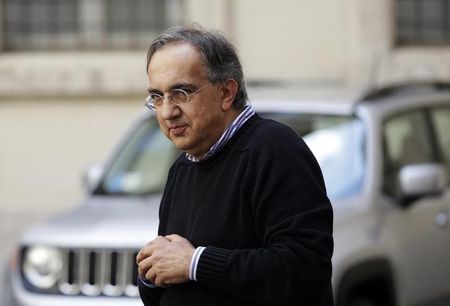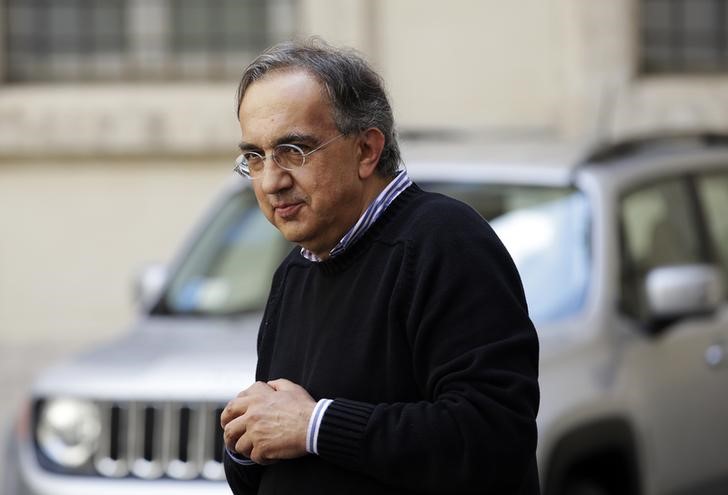By Paul Ingrassia and Laurence Frost
PARIS (Reuters) - With the landmark listing of Fiat Chrysler Automobiles (MI:FIA) less than two weeks away, CEO Sergio Marchionne has a clear criterion for success: more than half of the merged company's shares changing hands in New York instead of Milan.
"If we do more volumes in New York than we do in Milan, that's a good benchmark," Marchionne said in an interview at the Paris auto show, adding that current Milan trading volumes often top 10 million share transactions.
"If that number were to go 6 million in the U.S. and 4 million in Europe I'd be happy," he told Reuters.That outcome would also be distinctly different from what occurred after Chrysler's 1998 acquisition by Daimler (DE:DAIGn), in which trading in DaimlerChrysler shares was heavily weighted toward Germany. That ill-fated deal collapsed a decade later amid a destructive clash of two corporate and national cultures that Fiat and Chrysler have managed to avoid.
Fiat took management control of Chrysler in 2009 after the American company emerged from government-sponsored bankruptcy. Earlier this year it completed its purchase of all outstanding Chrysler shares, and the listing of the new Fiat Chrysler is scheduled for Oct. 13.
With a small corporate headquarters in London, incorporation in the Netherlands and major operating centres in Turin and Detroit, Fiat Chrysler aims to be the first successful automaker combining multinational roots with international reach.
The new primary listing on the New York Stock Exchange opens access to the world's biggest and most liquid equity market and the cheaper, more reliable source of funding it ultimately offers.
"When you look at carmakers in the U.S. there will be three choices: you either go GM, you go Ford or you go FCA," the CEO said.
TEN YEARS IN CHARGE
The listing follows another milestone -- Marchionne's 10th anniversary at Fiat, where he took over as CEO in mid-2004 as the Italian carmaker was itself teetering near bankruptcy. "My first Fiat auto show was the Paris show in 2004," said Marchionne. "We've come a long, long way in 10 years."
Indeed, many auto-industry observers doubted his ability to revive Fiat and were even more skeptical of his chances of rescuing Chrysler in 2009. But now the company is solidly profitable, albeit heavily indebted, and its brands include Fiat, Jeep, Chrysler, Dodge, Alfa Romeo, Maserati and Ferrari.
Soon after the listing, Fiat Chrysler intends to float shares it currently holds in itself and new stock to offset part of a 464 million euro buyback from existing investors - together worth "in excess of half a billion euros", Marchionne said.
In an unusual move, he won't be doing the traditional "road show" for prospective investors before the share listing. Marchionne said he doesn't have much new to add after a daylong investors presentation in May, in which he laid out a five-year plan so ambitious that Fiat shares plunged nearly 12 percent the next day, causing trading to be suspended temporarily in Milan for excessive volatility.
But Marchionne continues to stand by those aggressive 2018 sales and performance targets, including a 60 percent increase in sales to 7 million vehicles, the elimination of industrial net debt that reached 9.7 billion euros at the end of June and the relaunch of Alfa Romeo as a global premium brand.
Fiat's earlier turnaround defied the doubters and "nobody believed the 2009 plan at Chrysler, but we delivered all the numbers," he said."Extend the same benefit of the doubt to this plan as you did to the others."
After heavy investment in 2014-15, Marchionne added, "in 2016 the machine turns and starts spitting out cash." The company projects net income between 1.9 billion and 2.5 billion euros by then, about triple the projected earnings for this year.
A prime target for investment is Jeep, which the company will start building in new factories in both Brazil and China during 2015. The company is also developing a new version of its bread-and-butter minivan to be built in North America late next year.
Marchionne has been coy about whether Fiat Chrysler will raise new capital to fund its ambitious investments, but he gave strong hints during the interview that he hopes to avoid that.
"I've taken the view that a rational economic agent would not raise capital," he said, while declining to discuss his likely recommendation to an Oct. 29 board meeting.
"Doing nothing is an option - we're sitting on 20 billion euros of cash," Marchionne said. Fiat Chrysler has total debt of 32 billion euros.
FERRARI BRAND
One of Marchionne's prime goals is increasing the value investors put on the iconic Ferrari brand. Marchionne has ruled out a Ferrari sale or partial share listing for the near future, but he is less categorical about longer-term -- describing the sportscar maker as a "phenomenal carrot" to investors.
Ferrari is "one of the biggest repositories of value inside Fiat which is yet unexpressed," he said on Friday. "Optionality in all things is worth tons ... whether it be a listing, a trade sale or the continuation of the asset inside FCA."
Marchionne said Ferrari should be valued by investors at 7-10 billion euros, roughly the same as the entire group's current 9.2 billion market capitalisation. Analysts have put the value closer to half that amount.
Boosting Ferrari production beyond the current 7,000 cars a year is possible, Marchionne said, while vowing to proceed cautiously. Going too far, too fast would risk impairing the value of used Ferraris, he explained, which many owners use to trade up to buy new ones.
As for the Paris show itself, Marchionne said the paucity of exciting new cars on display reflected the current condition of the European auto industry and market.
"The best I can say about Europe is that it's found its bottom," he said. "I don't think it's going to get worse than this but I'm not sure it's going to get much better."

(Additional reporting by Agnieszka Flak; editing by Keith Weir)
